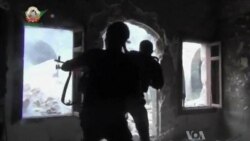LONDON —
A recent report from the British Parliament says the country has arms sales contracts with six countries it has designated as having poor human rights records - and several others with questionable records. The document highlights a dilemma faced by all arms-exporting countries.
The British news media used strong language to report the story, and graphics to show where the country’s military equipment is being sold.
It seemed embarrassing, but it was not surprising to experts, like War Studies Research Associate Jack McDonald, of London’s King’s College.
“The problem that the UK finds itself in is the same one that any arms exporting country finds itself in, which is that the biggest buyers tend to have human rights records that we would consider fall short of our own standards,” said McDonald.
In recent months, Western plans for military sales to the Syrian opposition have gotten a lot of attention, particularly as its militant elements have grown. Russia has condemned the plan.
Russia's Deputy Foreign Minister Sergei Ryabkov said, “The European Union, in fact, is pouring more fuel on the fire of this conflict and damaging the prospects for convening a peace conference.”
At the same time, Russian sales of anti-aircraft missiles to the Syrian government have drawn criticism from the West, and from Israel’s Deputy Foreign Minister Zeev Elkin during a visit to Moscow. "Israel is expressing a grave concern about prospects of such deliveries. We asked for deliveries to be suspended until the situation stabilizes,” said Elkin.
Meanwhile, China is becoming an ever larger player in the global arms trade and is also being asked to justify its decisions.
“On the issue of arms exports, China has always taken a responsible and prudent attitude, adhering to U.N. Security Council resolutions and international law,” said Hong Lei, Chinese foreign ministry spokesman.
The manufacture and sale of military equipment is important to the economies and defense programs of major countries. And officials say exports give them influence in troubled parts of the world. However, McDonald says it’s not that simple.
“Although selling arms to these countries gives us some leverage with them, I don’t think it’s axiomatic that they’re going to change their human rights records or accept our version of what human rights are,” he said.
It’s a delicate balance to strike, with countless lives and the future of nations at stake, leaving arms-selling countries in a permanent quandary and under criticism for virtually any decision they make.
The British news media used strong language to report the story, and graphics to show where the country’s military equipment is being sold.
It seemed embarrassing, but it was not surprising to experts, like War Studies Research Associate Jack McDonald, of London’s King’s College.
“The problem that the UK finds itself in is the same one that any arms exporting country finds itself in, which is that the biggest buyers tend to have human rights records that we would consider fall short of our own standards,” said McDonald.
In recent months, Western plans for military sales to the Syrian opposition have gotten a lot of attention, particularly as its militant elements have grown. Russia has condemned the plan.
Russia's Deputy Foreign Minister Sergei Ryabkov said, “The European Union, in fact, is pouring more fuel on the fire of this conflict and damaging the prospects for convening a peace conference.”
At the same time, Russian sales of anti-aircraft missiles to the Syrian government have drawn criticism from the West, and from Israel’s Deputy Foreign Minister Zeev Elkin during a visit to Moscow. "Israel is expressing a grave concern about prospects of such deliveries. We asked for deliveries to be suspended until the situation stabilizes,” said Elkin.
Meanwhile, China is becoming an ever larger player in the global arms trade and is also being asked to justify its decisions.
“On the issue of arms exports, China has always taken a responsible and prudent attitude, adhering to U.N. Security Council resolutions and international law,” said Hong Lei, Chinese foreign ministry spokesman.
The manufacture and sale of military equipment is important to the economies and defense programs of major countries. And officials say exports give them influence in troubled parts of the world. However, McDonald says it’s not that simple.
“Although selling arms to these countries gives us some leverage with them, I don’t think it’s axiomatic that they’re going to change their human rights records or accept our version of what human rights are,” he said.
It’s a delicate balance to strike, with countless lives and the future of nations at stake, leaving arms-selling countries in a permanent quandary and under criticism for virtually any decision they make.








